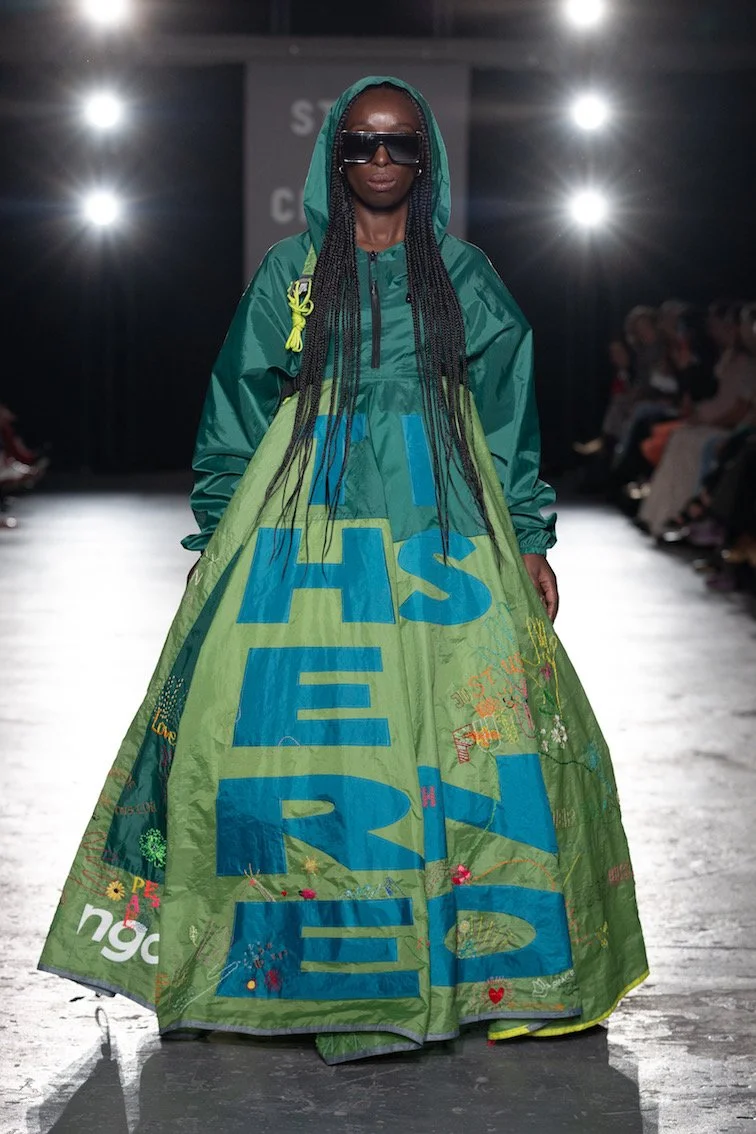Anthony Burrill x Oxfam
Happy Secondhand September! Six years ago Oxfam UK came up with the idea of using September to encourage people to: "Shop second hand to take a stance against fast fashion and dress for a fairer world." They say it's a moment to come together “to choose a more planet-friendly way to shop, and dress for the world you want to see."
How does preloved help with that? We all know that fashion waste is a problem, that new clothing and textile production is a serious contributor to the climate crisis. According to ThredUp, if every consumer bought just one this year secondhand garment instead of a new one, it would he like equal to taking 76 million cars off the road for a day.
Plus by shopping with Oxfam, and other charity shops, you’re investing in the vital work in local communities.
This week Clare sits down with mega multi-tasker Eunice Olumide MBE - model, environmentalist, broadcaster, DJ, author, curator now filmmaker (phew!) - ahead of Oxfam’s London Fashion Week show, to discuss thrifting, her new documentary about the history of British hip hop, moving beyond performative activism, and the challenges of championing secondhand in a world still dominated by the business model of new.
Climate Revolution with Vivienne Westwood
ABOUT EUNICE Scottish model Eunice Olumide was scouted aged 15 while shopping in Glasgow. A passionate environmentalist, she worked for may years with Vivienne Westwood around climate, she's a broadcaster, DJ, author (she wrote the 2018 book in How to Get into Fashion), actor, she was in star wars! What else, she's a curator she has own gallery, and now a filmmaker - you'll hear us talk bout that.
She's also an MBE - in 2018 she was honorued for her services awarded for to broadcasting, the arts, and charity. she accepted the award from prince charles, then donated to the National Museum of Scotland so that others can reflect on the difficult topic of empire.
Secret Lives: The Untold Story of British Hip Hop
You might also want to WATCH Eunice in the 2021 Netflix series, The Outsiders. It's fascinating, confronting stuff based on interviews with young black creatives talking about fitting in, standing out, forging ahead and "their singular experiences of identity and excellence in the US and UK".
Eunice walking the Style For Change show at LFW September 2024. Her dress is upcycled from old tents.
“Buying secondhand is a form of activism.”
NOTES
The theme if this year's Oxfam show is Style for Change. Eunice will be walking. Follow along via the Oxfam IG here. Eunice was also in last year’s show, which opened LFW. It felt super significant having pre-loved in this prestigious spot on the schedule, when generally fashion weeks everywhere are about newness, trends, selling the next collection ...
BAY GARNETT was on Episode 108.
Here’s that report Clare mentions in her intro about secondhand furniture’s climate impacts.
But remember SECONDHAND IS NOT A FREE PASS TO OVER-CONSUME. This is something covered in Episode 201 with JENNA FLOOD.
This year’s Oxfam show was in partNership with VINTED. Vinted is Europe’s leading international online C2C marketplace dedicated to second-hand fashion, with a growing community of members across Europe and beyond. With a mission to make second-hand the first choice worldwide, Vinted enables people to sell and buy second-hand clothes and lifestyle items from each other, helping give those items a second or even third life.
See below for SECONDHAND SHOPPING TIPS from the Center for Biological Diversity.
1. Less is still more: Just because secondhand shopping is cheaper and more eco-friendly than buying new, there’s still a cost to purchasing things you don’t really need. Overbuying and dumping secondhand items will continue to perpetuate harm, pricing out families who don’t have as much choice in where they shop and increasing the waste headed to landfills. Choose items you know will be loved, and think about the long-term usefulness of all products you buy.
2. How we donate matters, too: Although buying secondhand helps keep used products out of landfills, some things that secondhand shops can’t sell still end up there, so it’s important to only donate good reusable items.
The popularity of fast fashion means that lower-quality apparel and other items — like cheap, harmful plastic products — are increasingly ending up at secondhand stores, and that has very real negative impacts for families who thrift out of necessity and the stores that sell the goods. Some donation centers even ship excess products overseas, competing with local businesses in emerging markets.
These global issues demand larger transformations in consumption and production, but as individuals we can help by considering the durability of an item — whether it’s new or secondhand — before purchasing or donating it.
THANK YOU FOR LISTENING. Please do get in touch if you like the show, and help us continue to make it by growing our audience. Sharing it on social media, or just with your friends, rating, reviewing or simply recommending it, makes a huge difference.
Find Clare on Instagram @mrspress




